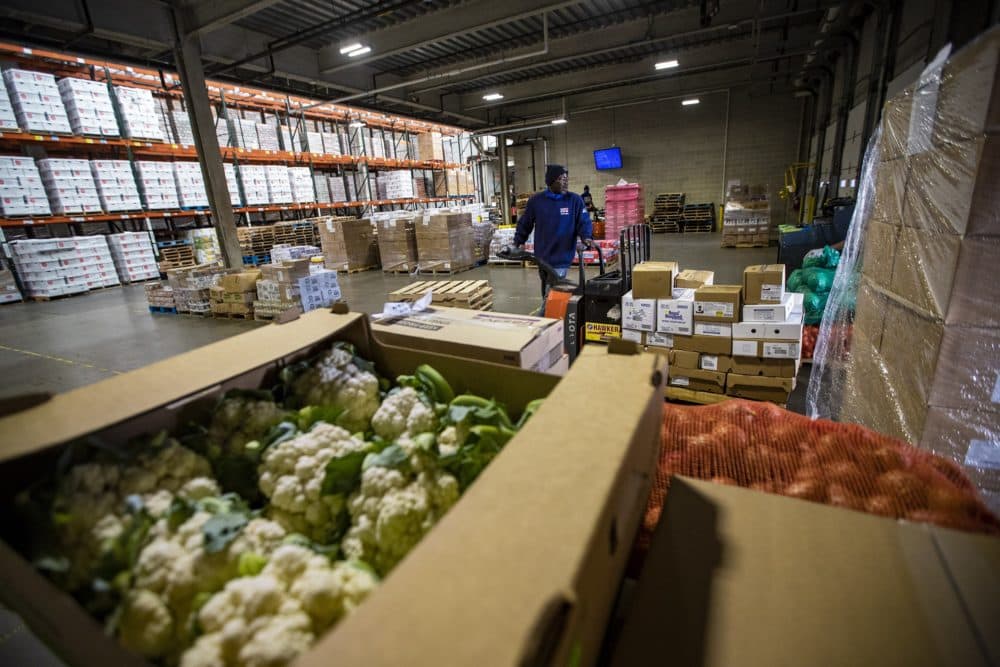Advertisement
1 Million People In Mass. Are Food Insecure

One million people are struggling to get enough to eat in Massachusetts. The hunger rate is up 59% since 2018 and one in five children in the state are food insecure. Those numbers are from Feeding America, a national nonprofit and network of over 200 food banks.
The pandemic has exacerbated all aspects of hunger in the region, from the need to the logistics of meeting that need around the state.
We get an on-the-ground look at serving those who need food support with Andrew Morehouse, the executive director of the Western Massachusetts Food Bank, and Norris Guscott, who runs Lynn's Food Security Task Force and is the director of Lynn's Food and Fitness Alliance. We also talk with Rep. Jim McGovern about federal policy affecting hunger and food aid.
Interview Highlights
On what it means to be food insecure?
Guscott: "Food insecurity is defined as not having access to enough healthy, affordable food. That's going to look different from area to area, state to state, and Lynn in particular, that's tied to socioeconomics. So that's, how much money have I got to purchase food? Can I easily get to where they're selling this food? And do I know what foods I need to nourish myself or my family?"
"We live in the richest country in the history of the world and we have, you know, tens of millions of people who are hungry. And we had a hunger problem well before this pandemic, but this pandemic just blew the lid off of the crisis ..."
Rep. Jim McGovern
On the current moment in hunger:
McGovern: "It makes me feel ashamed. I mean, we live in the richest country in the history of the world and we have, you know, tens of millions of people who are hungry. And we had a hunger problem well before this pandemic, but this pandemic just blew the lid off of the crisis and is forcing us to reckon with the fact that we have a hunger crisis in America that needs to be addressed. And as I tell people all the time, hunger is a political condition. We we have the money. We have the resources. We have the the know-how and the infrastructure. What we do not have is the political will. And that has to change for us to be able to solve this crisis."
On how this moment compares to the Great Recession?
Morehouse: "That was almost like a drip great recession. It didn't happen or it didn't affect the individuals overnight. It took time. So we had the opportunity and the resources to address it as it unfolded. Whereas in the case of COVID-19, you know, there was just such a sudden spike in food insecurity associated with the onset of COVID-19 across our commonwealth that it created a lot of chaos. We just really weren't ready to respond to such a dramatic increase in food insecurity, and, at the same time, an outpouring of interest to support our efforts and get food out to people in unusual ways because our normal way of distributing food had been disrupted due to the health concerns that people faced."
On who food insecurity is affecting:
Guscott: "We can see that when we say who's hungry, those are folks who have recently lost their jobs. Those are, you know, COVID-19 positive families. Those are the individuals who have always relied on, you know, food resources. There have always been some issues within the food system in this pandemic has exposed that, not just in [Massachusetts,] but the U.S. as a whole. And this is an opportunity to finally address some of the glaring shortfalls in the food system."
On not being able to meet the need:
Morehouse: "This is a very imperfect system that we've created in the United States of America — a puzzle of charitable, of hunger response or food insecurity response, coupled with public sector supports at all levels, local, state and federal, and just a plethora of federal nutrition programs that all kind of intersect to try to meet this need. ... Our biggest concern is that now that federal funding has pretty much ended for food for this fiscal year without a new budget and no economic stimulus package in sight, at least until after the inauguration, we're concerned about that as we are about state funding. Between state and federal funding, that represents about half of our food inventory. So if anything, we need to get that secured and ideally, we need an increase in in order to meet the demand that's out there. But we'll never know if we're really meeting the full demand."
"This is a very imperfect system that we've created in the United States of America -- a puzzle of charitable, of hunger response or food insecurity response, coupled with public sector supports at all levels, local, state and federal, and just a plethora of federal nutrition programs that all kind of intersect to try to meet this need."
Andrew Morehouse
On government efforts to mitigate hunger:
McGovern: "We actually started making progress to eradicating hunger in the late 1970s. And then, you know, when Ronald Reagan became president, then our politics took a sharp turn to the right. It became fashionable to diminish the plight of those who were struggling, those who were poor. And even today, if you listen to any of the debates on the SNAP budget in Congress, it really is disturbing because, one, it doesn't reflect reality, but two, it's all about bashing people who are struggling. ... I hope the next president of the United States will take it upon himself to do a White House conference on food, nutrition and hunger, because to solve this problem ... we need to look at this more holistically and not just a program by program by program, ... including our medical profession, our doctors and our hospitals, because this is a health issue, too. We need to get them all in a room and we need to figure out a holistic, comprehensive plan to be able to end this scourge once and for all."
On what needs to happen in the short-term:
McGovern: "My hope is that when we go back into session next week, the Senate majority leader, Mitch McConnell, will finally want to come to the table and [we can] see if we can work something out. And and we may have to come back again in February when, you know, President-elect Biden becomes President Biden to do more. But, [right now, we are] experiencing, as a result of this pandemic, you know, a worsening of this crisis. And and it is really a scandal. And it is criminal that the federal government hasn't stepped up to the plate and provided relief. These are our fellow citizens who don't even know where their next meal is going to come from. ... It's unbelievable. We need to do better. And again, we need to increase the political pressure on our elected officials to make this a priority."
This article was originally published on November 11, 2020.
This segment aired on November 11, 2020.

